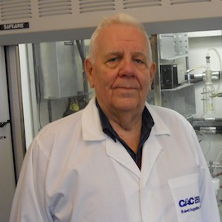
Robert Augustine
Professor Emeritus and Executive Director of the Center for Applied Catalysis
Department of Chemistry and Biochemistry
(973) 761-9033
Email
Robert Augustine
Professor Emeritus and Executive Director of the Center for Applied Catalysis
Department of Chemistry and Biochemistry
Dr. Augustine received his doctorate in 1957 from Columbia University for research in the area of natural product syntheses. Because of the need for a stereoselective route to a potential intermediate in the synthesis of quinine, he became involved in research on the effect of reaction variables on the stereochemistry of catalytic hydrogenation. This interest in hydrogenation led to the publication in 1965 of the monograph "Catalytic Hydrogenation, Techniques and Applications in Organic Synthesis". His tenth book "Heterogeneous Catalysis for the Synthetic Chemist" was published in October, 1996. For a number of years he directed a research group involved with both synthetic organic chemistry and catalytic hydrogenation. Over the past thirty five years, though, his research activities have been concerned almost exclusively with the utility of heterogeneous catalysis in synthetically useful reactions; hydrogenations, oxidations, metal promoted carbon-carbon bond forming reactions and shape selective zeolite catalyzed aldol reactions.
Since coming to Seton Hall University he has supervised research which has led to the writing of thirty seven doctoral dissertations and nine masters theses and the publication of over one hundred thirty research articles, ten books, seventeen patents and several chapters in the areas of organic synthesis, mechanism and utilization of catalytic hydrogenation, catalyst comparisons, surface characterization of metal catalysts, the use of dispersed metals in reactions other than hydrogenation and the anchoring of homogeneous catalysts onto solid supports.
He served as the Executive Director of the Center for Applied Catalysis at Seton Hall University. This Center was established in 1997 and is engaged in collaborative research with industry on various aspects of catalysis, particularly in the use of catalysts in the synthesis of pharmaceuticals and fine chemicals and, more recently, in the conversion of material obtained from bio-mass into chemicals presently obtained from petroleum.
His interest in the utility of catalysis is also manifested in his professional interests. He was a founding member of the New York Academy of Sciences Section of Catalysis (1968) and the Organic Reactions Catalysis Society (ORCS) (1973), two groups devoted primarily to the discussion of the practical, utilitarian aspects of catalysis. He has served as Chairman of the Organic Reactions Catalysis Society (ORCS) and as a member of the Board of Directors of ORCS, the North American Catalysis Society and the Metropolitan Catalysis Society. He has also been a member of the Advisory Board of the New York Academy of Sciences Section of Catalysis.
Education
- Ph.D. 1957, Columbia University, NY,NY
- MA, 1955, Columbia University, NY, NY
- B.S. CHEM, 1954, Creighton University, Omaha, NE
Accomplishments
1955-1957 NIH Predoctoral Fellow
1977 Recipient, McQuaid Medal for Distinguished Service to Seton Hall University
1988 Recipient, Joseph P. Hyman Award for teaching excellence from North Jersey Section of American Chemical Society
1990 Recipient, Paul N. Rylander Award for outstanding contributions to the use of catalysis in organic reactions from the from the Organic Reactions Catalysis Society
2003 Recipient, Henry J. Albert Award for "major technical and commercial contributions to the field of precious metals catalysis, over a distinguished career that embodies the ideals of this award", from the International Precious Metals Institute (IPMI).
2010 Recipient, Russell E. Malz Award from the Organic Reactions Catalysis Society for "Exceptional Service to the Organization".
2012 Inducted into the Hazard Zet Forward Society "In gratitude for unwavering and loyal support of Seton Hall University".

